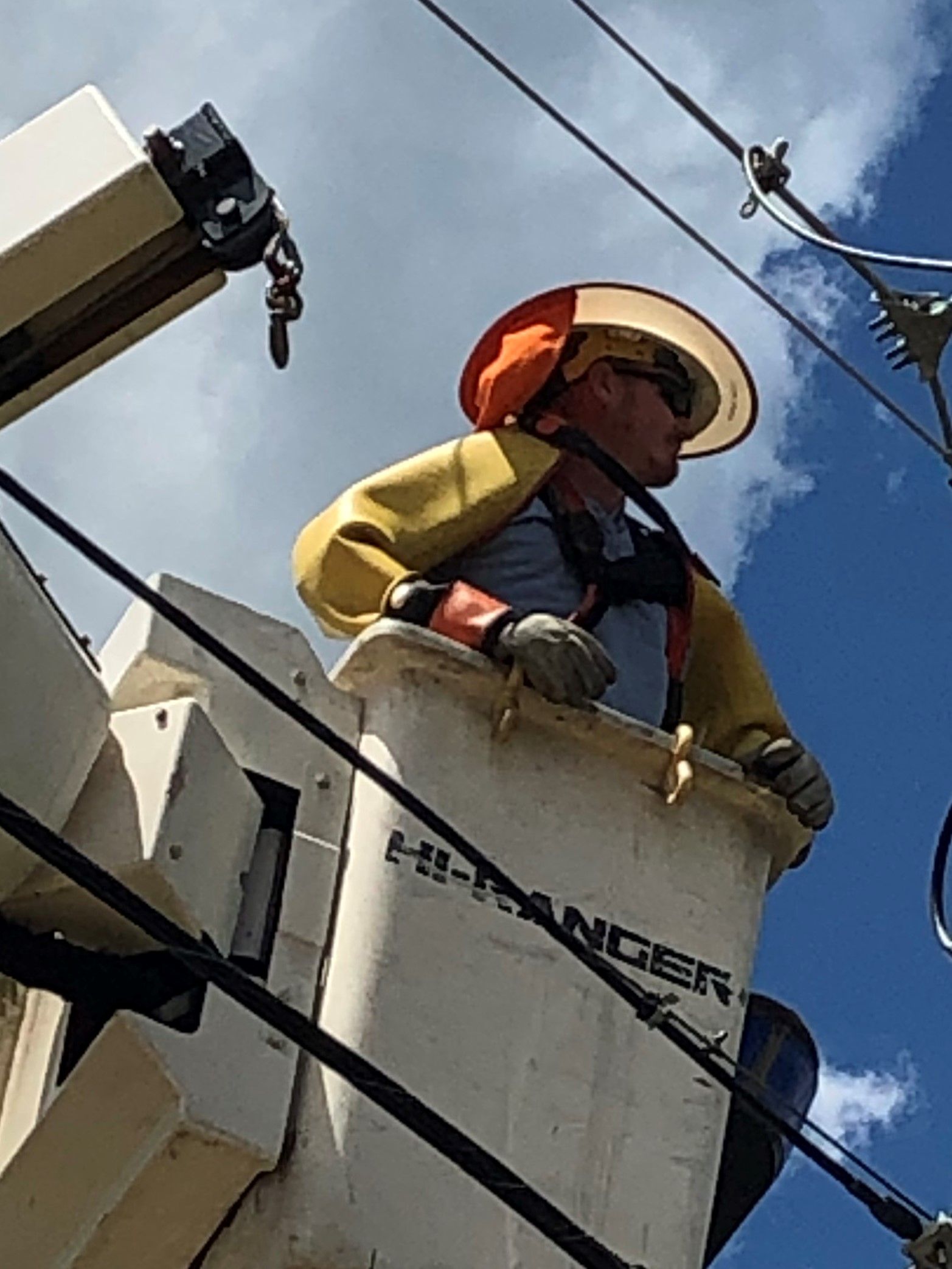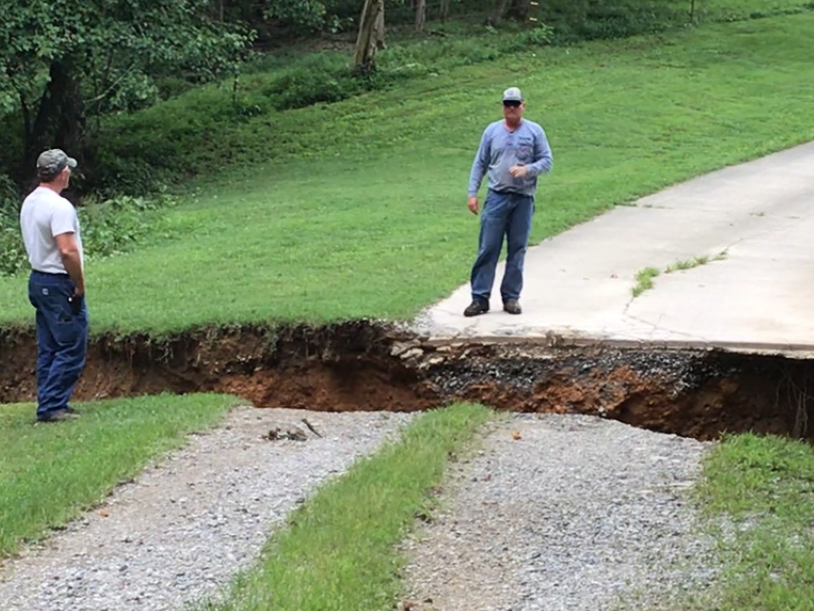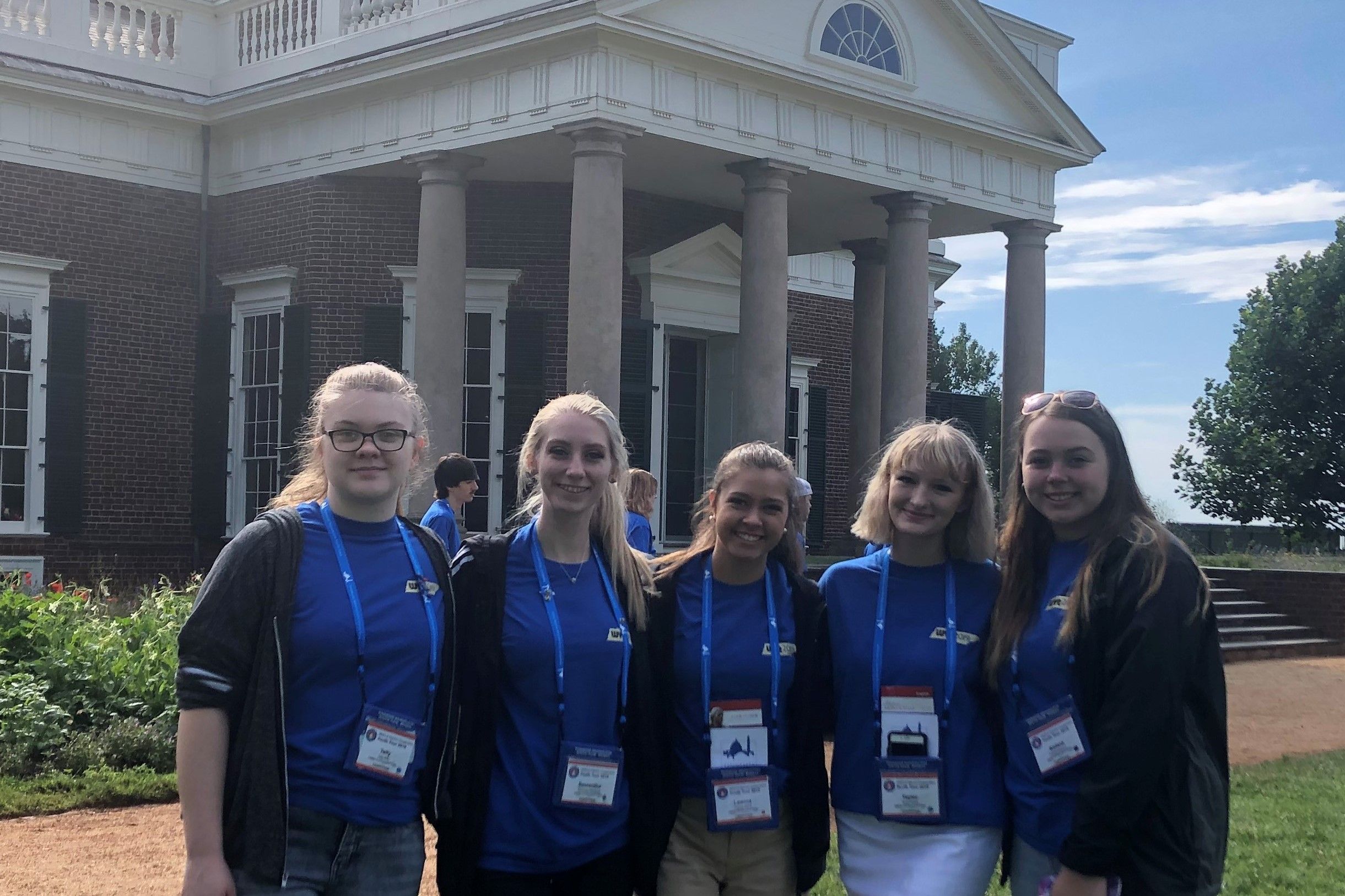
If Amberlee Taylor had her way, the words to the song Dance Like Nobody’s Watching would be changed to Work Like Everyone’s Watching; a theme that not only describes her work ethic but her philosophy of life.
It was Taylor’s attention to detail during a local Jaycees volunteer clean-up day at the non-profit Camp Discovery that got her people-friendly management style noticed. She was offered a full-time “position” on the spot and four years into her adventure as a volunteer Director of Operations at the 186-acre facility, she’s still a stickler for putting extra effort into everything she does.
We caught up with Taylor during a rare break from working the phones and supervising crews.
Tell us more about being “discovered” at Camp Discovery and how it led to this opportunity?
“Like many people, I only saw the Camp Discovery signs along the highways in Gainesboro and didn’t really know what it was. I was already volunteering with the local Jaycees when I was introduced to the facility to supervise volunteer cleanup crews after camp and conferences. One day, the vice president contacted me out-of-the-blue and it was a complete shock because there was no formal open position at the time. The VP said he watched closely as I was working with the Jaycee volunteers. He said he saw me make a disgusted face when I was watching someone changing trash bags in a large bin. He observed a young woman as she shoved a new bag into the dirty bin, but he said that he was impressed that I stopped her and accompanied her outside to first give the bin a good scouring. He said that he knew I would pay attention to details that others overlook and that I obviously was not afraid of stepping up and directing others. I guess it goes to show that you never know who is watching and that great opportunities may come from putting extra effort into anything you do; whether you really want to so the task or not.”
Is Gainesboro your hometown? What kind of work did you do before landing this position?
“Gainesboro is my home now, but I’m from everywhere: North Carolina, South Carolina, New York, Ohio, Florida, and The Bahamas. You can say that I was a wanderer and I’ve done a little bit of everything; from world champion horse breeder, construction, estate planning, nanny, college advisor, rancher, bio-chemical industry assistant and ecology adventurer. I’ve traveled so much in my life and I’ve even managed to do a lot of home and pet-sitting for many families along the way.”
We’re referring to you as the Director of Operations – is that your official title?
“My title? Now that’s a question with multiple answers! What do you call a person who has to know just about everything related to on-site maintenance: I have to know about landscaping, managing equipment and knowing who does which repairs, managing contractors for building upkeep, overseeing pool cleaning, volunteer and project management, and I host rental and camper showings to potential clients. So far, I’ve been called: On-site Manager, Chief/Director of Operations, Estate Manager, and on a good day, the Make-It-Happen Gal. Take your pick. I go by any title.”
Is this the kind of position you imagined for yourself as a child?
“This was a totally pleasant surprise! Out of college, I started in ecology travel and that worked into back-country horsemanship, and then I opened and operated a horse ranch in New Zealand. Life then tossed me a curveball and I focused on less physically taxing positions to keep me busy like Criminal Justice and Homeland Security. After another curveball, I ended up here. I’m surprised and delighted that my education and variety of positions I’ve held in the past have led me to this point.”
Describe the average summer workday at the camp:
“The camp is buzzing with campers, renters, and hundreds of volunteer groups during the summer and that certainly keeps us moving around here. The schedule is engrained in me after so long. Here goes:
4:30-6a – Paperwork. Loads of it.
6-7:30a – Overseeing pool maintenance and making sure that the crew has the water chemically balanced and ready for the busy day.
8-10a – Back in the office working the phones to contact repair people if any are needed, getting estimates on repairs and new project costs, returning calls from prospective renters.
10-8p – Showing prospective renters and camp groups the property, answering any questions they might have, making sure that the various landscaping crews are where they need to be and doing what they need to be doing, pointing out any downed limbs that need to be removed in the mower’s path, managing deliveries and trying to fit a meal or two in there somewhere.
8-10p – Catch up on emails/make my list for callbacks for the next day/next day’s chore list for volunteers.
9:59p– Say my bedtime prayers that no major issues come up for us during the night.
10p – 4:30a – Getting a good night’s sleep if all goes as planned. If not, I’m on call to supervise any camp equipment/maintenance issues.
That’s a busy day! What’s your favorite part of this daily routine?
“The people – from renters to summer campers – you can explore a whole new world by meeting different people all in one place. From business professionals, newlyweds, religious groups, special-needs individuals to Wounded Warriors, Wildlife Resources officers, and law enforcement, there is a diverse group of people coming through our gates constantly and that is the one thing I enjoy most about being here. I would say the view from my hammock is another one of my favorite things, but the only time I really get to enjoy the view is when I’m showing it off to someone else! Watching the dogs chase the geese back into the water brings out the “fun kid” in me too.”
The task you least enjoy doing?
“Paperwork! I’m very good at it, but it takes so much time and I’m constantly thinking about how much fun I would have planning activities for the week if I had someone else doing the paperwork.”
This is quite a facility to manage! Does it seem overwhelming during the busy season?
“It is huge: There are 186 acres with eight rentable buildings, three camper cabins that hold thirty people each, the main lodge that has a full kitchen and living room; six bedrooms with two full-size beds in each, the nurses building with three bedrooms, a dining hall and a full-service kitchen, an attached pavilion with wood-burning fireplace, the lakeside pavilion, a private dock and boat ramp, and of course a pool and pool house. Mainly, we use the front half of the property which is 20-30 acres. The back half and wooded areas are hay fields and future development sites. I try to simply take one day at a time and have gratitude for the large groups of volunteers who are here to help us with anything that needs to be done.
How does your job change with the seasons?
“There are fewer landscaping issues and crews to deal with and the pool is shut down. That gives us more time to look closely at the high-priority maintenance issues. The last few years have meant road work and roofing. This coming winter and into the spring, we would like to address changing over the LED lighting on the inside and out, redoing porches, painting, and doing some ramp repair.”
Describe the setting at the camp and the wildlife. Is there anything you have to do pro-actively to prevent wildlife damage to the property?
“The wildlife is in abundance from small to large critters. We have plenty of deer roaming throughout the day and plenty of people to keep an eye on their safety. Raccoons are always peeping in the trash and our skunks have been known to wander around like they own the place. Black snakes are around as well; harmless helpers that chase away the rattlers and copperheads. We put out wildlife deterrents for snakes and skunks next to our buildings and main walkways. The most damage we get currently is from wood bees and Woodpeckers because we have solid wood cabins. Wood bee traps are hung and we have a specialist that we call once a year to keep them at bay. As for the Woodpeckers, we have to keep deterring them and filling up the holes they create which is a constant battle. Geese are another nuisance here because we’re on the water’s edge and have lovely mowed grass which is a buffet in their eyes. Their droppings can be a carrier of harmful bacteria that can make people sick, so we try to keep them off the property. I have two large, trained dogs that chase the geese back to the water, but then, you wake up the next morning and there they are, so it’s a constant struggle.”
This position looks like a lot of fun, but there is also a great deal of responsibility. Would you recommend this job to others who like to spend time outdoors?
“There definitely has to be a certain level of independence and willingness to learn or know multiple trades to do this job. If you don’t know a little about everything on the property, you could be at a disadvantage when it comes time to contact the right person to make the repairs. This job is not as easy as many people would think. Our hours are dependent on the weather, but the work goes on and on no matter what. You must be able to prioritize and delegate. It’s like being your own boss and if someone doesn’t pull their own weight or if they have a family emergency, you have to be ready to change your day and add their workload to your plate. Even though this facility is peaceful and fabulous, for those of us behind the scenes, it can be stressful. You have to know how to deal with this life of details and not bring work into your personal life. Any job can take over your life and you may not even realize it. Here, summers are the toughest because you are on call 24/7 for eight to nine weeks for camper summer sessions. Then, the offseason most weekends are booked for rentals and you must be on site for 48-72 hours to supervise. Most people are off enjoying their weekends while you have to work. Finding balance is crucial to surviving this way of life.”
What are some of the skills/strengths/abilities a person needs to do this job?
“It helps to be independent and self-motivated; skilled at time management and have flexibility and adaptability. A positive attitude and a strong work ethic are essential; organizational skills, problem-solving skills, the willingness to learn, and teaching skill sets come in handy. A focus on leadership and teamwork, communication skills (written and oral), and overall willingness to work even on the days you were supposed to have off, and, of course, attention to detail all come into play with this job. Even as an unpaid volunteer, you must think of it as a job. It’s something different every day and you have to be able to cope.
You have two very big dogs – are there any other pets who are enjoying their time with you when you’re in this fabulous setting?
Besides my dogs, I have a cat and six goldfish. My mom gifted me one of the goldfish when it outgrew her tank. It’s now about 10 inches long. JAWS needs to be moved to a Koi pond by next spring.
How do you relax after a harrowing day?
Relax? What’s that? The summers are taxing so, for me, it’s just mainly the routine of passing out and getting up and doing it all over again. When I do get the time to relax it’s usually when I take the dogs for a walk down by the water. Watching the Osprey cruise up and down the waterway to dive for their snack is awesome and very relaxing for me. I also love outdoor photography, mostly animals and landscape; and I get a beautiful view many mornings of the fog lifting and a Blue Heron hanging out at the bridge. If I’m lucky, he’ll let me get a close-up before he flies away.
Any landscaping tips you could offer us Do-It-Yourselfers who don’t have a manager to direct us?
“The most important tip I can give is to make sure you understand the long-term maintenance and upkeep of the project you have in mind. Flowers and plants are grand but you have to ensure water sources are close by if a plant can’t tolerate dry conditions. Find out if those plants need to be trimmed to help positive growth. Ask yourself if you’ll have the time to keep up with the upkeep. Pine straw is amazing at keeping weeds down and the straw is little or no maintenance versus wood chips. Trim your trees lower limbs up to tractor-height whether you push or ride to mow. Your trees need to be high enough so that if there are heavy rains the branches won’t sag with water weight and be in your way. Low branches are dangerous and even on a zero turn mower, the safety bar can snag on a branch and cause serious injury. Get a zero turn! These crews make it look so easy on these mowers. You just may start to enjoy mowing enough to mow your neighbor’s lawn too.”
What’s your secret to being happy wherever you’re planted?
“That is the ultimate question in life is it not? For me, it’s enjoying the moments that make me laugh, smile and simply warm my heart. Whether it’s something silly that makes me laugh at myself, or spending time with friends and family talking about old times. There is so much beauty and you have to do what you need to do to be happy. I think people worry too much about money and impressing others and forget to enjoy the experiences and connections with people and nature that surrounds them. I’m content in myself and my actions in life, and I’m the only one who can ensure that what I do (or don’t do) makes me happy.
Have you ever had an electrical problem that UCEMC was able to help with in your time of need?
“This has happened a few times mainly because we have a set of lovely Osprey that is determined to make a nest behind our dining hall on the power lines. We’ve had power issues if their stick nest crosses the wires just right. UCEMC helped us after a transformer blew at our lodge cabin and they have quickly replaced our light sensors when they’ve gone out. Any time we have issues they are quick to service us and get us back up and running at full throttle. I see them all the time doing random line checks looking for potential problems since we have so many trees. It’s comforting to know that UCEMC tries to stay a step ahead so that minor issues are resolved before they become a major/serious one.
How does an organization rent Camp Discovery off-season for a company meeting or retreat?
“They can find our booking information through our website: jayceecamp.org. If they would like to tour the facility, they can email booking@jayceecamp.org and we can set up a time to show them around. Children and adults with special needs and their caregivers take over during June and July for camp, but in the off-season, this facility is available to any group or organization that needs a quiet getaway for employees. Our motto is “Everyone Deserves a Chance to go to Camp,” and that’s true! You’ll feel like a kid again. It’s a perfect location for weekend weddings, youth, church and social group retreats, school and family reunions – the possibilities are endless. It is indeed, a little piece of heaven right here in the Upper Cumberland!”



















